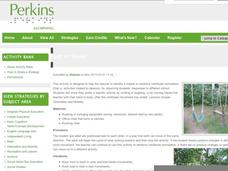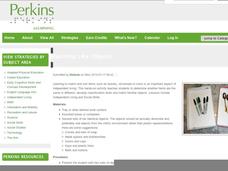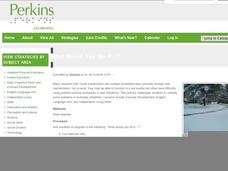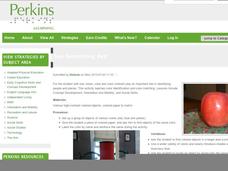Perkins School for the Blind
Adapted Sorry Board Game
Board games are great for building social skills and for fostering recreation and leisure skills! Here, you'll find an image and a brief description of how you can make a tactile version of the game Sorry for your blind or...
Curated OER
Fast or Slow?
Vestibular stimulation is an action or activity relating to balance and motion. To find out what kind of vestibular stimulation your learners with multiple disabilities enjoy best, follow these simple suggestions. You engage the child in...
Perkins School for the Blind
Building a Basic Series Circuit
Make science a fully accessible subject for your learners with visual impairments. They'll use tactile models to explore the nature of basic electrical circuits. Template board, wires, batteries, and Velcro are used to construct the...
Perkins School for the Blind
Conductors of Heat - Hot Spoons
Why is the end of a spoon hot when it's not all the way in the hot water? A great question deserves a great answer, and learners with visual impairments will use their auditory and tactile senses to get that answer. A talking...
Perkins School for the Blind
The Mystery Box - Making Observations and Collecting Data
Making observations and collecting qualitative and quantitative data is a vital skill all scientists need to practice. Help your scientists with partial and no sight learn how to use their other senses to make observations for...
Perkins School for the Blind
Volume, Mass, and Density Boxes
Mass and density are difficult topics for kids to understand, and even more difficult when you have visual impairments or blindness. Learners will make boxes and fill them with cotton, sand, or crushed paper. They will feel the density...
Perkins School for the Blind
Modified Golf
Golf is a popular game that is enjoyed around the world. Invite your pupils with visual impairments or blindness to putt a few balls or make a hole in one. This lesson provides several very good suggestions as to how you can teach an...
Perkins School for the Blind
Modified Kickball
Kickball is a classic recess game that everybody should play at least once. Included here is a wonderful set of instructions that describe how you can modify the game to make it accessible to children with low or no visual ability....
Perkins School for the Blind
Rolling Along
I cannot stress enough how important orientation and mobility training is for learners with visual impairments. To practice maintaining their balance, as well as work on building the confidence to participate in recreational sports,...
Perkins School for the Blind
Capture the Treasure
Did you ever play capture the flag? I did, and it was so much fun! Your learners with special needs, physical handicaps, or visual impairments can play a classic and highly engaging game with a few minor adaptations. The best part is,...
Perkins School for the Blind
Figure Eight Walking
Walking in a straight line is one thing. Walking while trying to shift your weight from side to side to maintain balance is another challenge altogether. Learners with visual impairments practice walking in a figure eight. Cones are set...
Perkins School for the Blind
Beanbag Toss
Why is learning how to catch and toss so important? If one has visual impairments, learning this basic skill will help him increase orientation and mobility, coordination, and cognitive development,. Mastery of this skill will also mean...
Perkins School for the Blind
Modified Disc Golf
Here is a great set of adaptations and modifications that will make your next game of disc golf accessible to all your pupils. Listed are several variations and ways you can modify the game for your learners with physical or visual...
Perkins School for the Blind
Cooking and Kitchen Tools
Independent living skills and skills that can be used to gain employment are very important for any learner. Teens with visual impairments explore the kitchen to understand what everything is and what it all does. The lesson includes a...
Perkins School for the Blind
Matching Like Objects
Same and different, sorting, and tactile discrimination are what's on the agenda for today. The class practices sorting objects and attempts to determine which objects are the same and different and why. The purpose is to increase...
Perkins School for the Blind
Packaging Snacks
Have your learners with special needs practice cooperative work skills, teamwork, and packaging. The kids will form an assembly line. Each pupil will add an item to a paper bag and then hand it off to the next person until the bag is...
Perkins School for the Blind
Bagging Groceries
Bagging groceries is a skill that can help learners with visual impairments understand organizing, problem solving, and weight discrimination. In addition, it is also a wonderful job skill. Help learners as they determine how to bag...
Perkins School for the Blind
Human Body Regulation
The human body can regulate itself through sweating and resting. Learners with visual impairments discuss how the body changes when it is under stress and what it does to regulate itself. To start, kids use talking thermometers to take...
Perkins School for the Blind
What Would You Do If...?
What would you do if...? That's a great question, and, when posed to learners with visual impairments, a question that can foster concept development and speaking and problem-solving skills that relate to real-life situations. The...
Perkins School for the Blind
A Visit to the Doctor
Going to the doctor's office may be a source of stress and uncertainty for some children. Help your learners with special needs discover what to expect at and how to cope with their next trip to the doctor. They explore real medical...
Perkins School for the Blind
I'm Thinking Of...
Learning how to describe an object or a person is a great way to develop verbal and written expression. Learners with special needs improve their verbal expressive skills and concept development skills while playing a guessing game. The...
Perkins School for the Blind
I See Something Red
For learners with low vision, the ability to identify colors is an important skill that will help them identify people and places. Groups of brightly colored objects are placed around the room. The child is then given a colored paper and...
Perkins School for the Blind
Letter Confusion
Teaching a child with low or no vision how to read is the same as teaching a sighted child how to read — it all starts with letter recognition. This is a simple way to provide your learners with an opportunity to practice reading and...
Perkins School for the Blind
Student Store
Vocational training activities are extremely important for learners with intellectual or physical disabilities. Here is a great idea that will help your class become skilled at money handling, basic economic concepts, interpersonal...
Other popular searches
- Class Newsletter
- Bill of Rights Newsletter
- Creating a Newsletter
- Newsletter Template
- Classroom Newsletters
- Autobiographies Newsletter
- Creating Newsletter
- Newsletter Writing
- Writing a Family Newsletter
- Back to School Newsletters
- Newsletter on Computer
- Student Newsletters

























